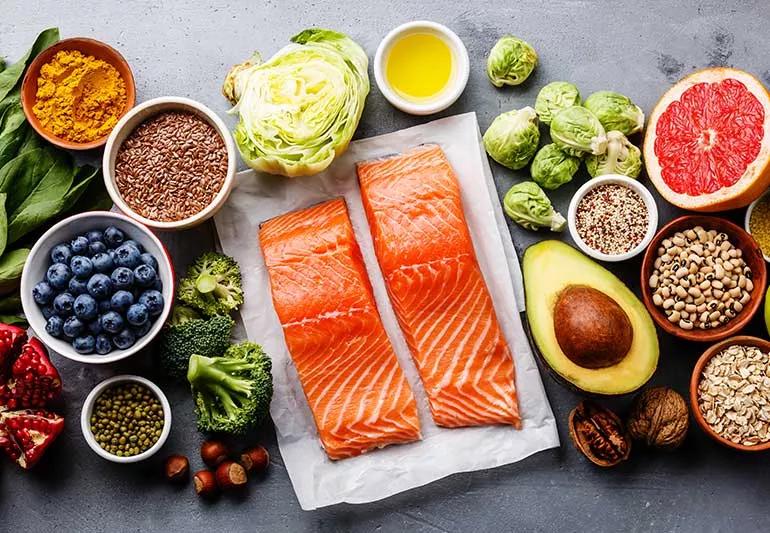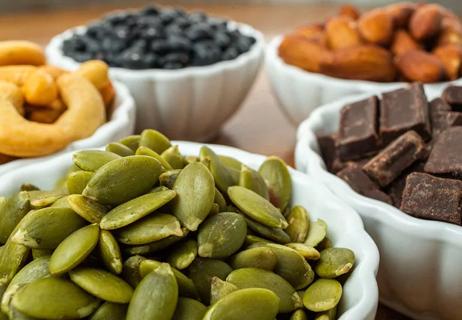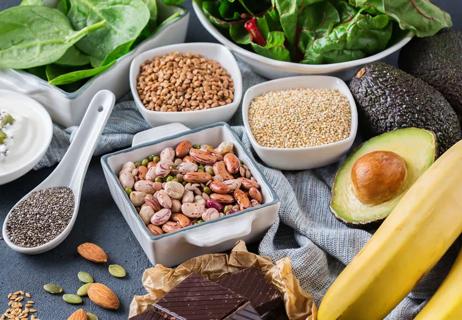They’re both essential minerals but do different jobs in your body

Manganese and magnesium may look like misspellings of each other, but they’re not the same thing. “These two nutrients are both minerals,” says registered dietitian Amber Sommer, RDN, LD. “You can even find them in a lot of the same foods, such as nuts and legumes. But manganese and magnesium perform different roles in your body.”
Advertisement
Cleveland Clinic is a non-profit academic medical center. Advertising on our site helps support our mission. We do not endorse non-Cleveland Clinic products or services. Policy
Sommer explains the differences between manganese and magnesium, what foods contain them, how much of each you need — and what happens if you get too much or too little.
Manganese and magnesium are both minerals that appear on the periodic table of elements. (Remember that poster from high school chemistry?) They’re also both essential minerals, which means you must get them from food, and it’s important to get enough every day.
“These nutrients play different roles in your body,” says Sommer. “And you need different amounts of them. Your daily magnesium requirements are quite a bit higher than your daily manganese requirements.”
Manganese is a trace mineral or micromineral, meaning you don’t need a lot of it. Still, it’s vital to get enough because your body requires it for many different processes.
“You may not need much manganese compared to other nutrients, but its impact is mighty,” says Sommer. “It plays a role in nearly every type of chemical process in your body that you can think of.”
For example, you need manganese for:
Advertisement
Research shows a link between diabetes and manganese levels in your blood. Interestingly, the study suggests there may be a “sweet spot” for manganese levels. People with Type 2 diabetes are more likely to have manganese levels that are too low or too high — a great example of how more isn’t always better.
You can find manganese in several healthy foods. Good sources include:
The National Institutes of Health (NIH) advises 1.8 to 2.3 milligrams (mg) of manganese daily for adults.
“Manganese deficiency is uncommon,” notes Sommer. “Most people get enough through food. For example, if you ate a half-cup of oatmeal, one slice of whole-wheat bread and a half-cup of brown rice, you’d meet your manganese requirement for the day.”
“But in the rare event you don’t get enough,” she continues, “you have a higher risk of health issues such as metabolism problems, PMS and weak bones. Manganese deficiency can also affect children’s growth.” If you’re concerned about your manganese levels, talk to your healthcare provider.
“If you’re only getting manganese through your food, you don’t have to worry about getting too much,” says Sommer. But if you take supplements with manganese, there’s a chance you could end up consuming toxic (highly dangerous) amounts.
“If you take multiple supplements, check the labels to see which ones contain manganese and how much,” she advises. “While manganese isn’t as common in supplements as some other vitamins and minerals, you should still be aware of your total amounts. It’s easy to overload yourself with certain nutrients through supplementation.”
Magnesium is also a mineral but not a trace mineral like manganese. You need quite a bit more magnesium. It’s considered a micronutrient. But, like manganese, your body uses magnesium in hundreds of different processes.
You need magnesium for functions such as:
Most people get enough manganese, but magnesium is a different story. According to the NIH, many people in the U.S. don’t get enough magnesium through their food. Older men and teenagers are most likely to have a deficiency. However, people who get magnesium through supplements usually have plenty of this nutrient.
Advertisement
What happens if you’re not getting enough magnesium? “You may not have any signs of low magnesium, especially at first,” says Sommer. “But over time, you can develop some serious health problems, including heart problems and seizures.” Talk to your healthcare provider about getting a blood test to check your magnesium levels — especially if you’re over 60 or have symptoms like heart rhythm issues or fatigue.
You can find magnesium in many different foods. Examples of the best sources include:
“As with manganese, you’re unlikely to go too far with magnesium if you’re only getting it through food,” says Sommer. Your kidneys typically get rid of extra dietary magnesium.
But an overload of magnesium from supplements can send you running for the toilet. That’s because magnesium is a natural laxative. It’s the main ingredient in some laxative products. “If you take too much magnesium (more than around 350 mg in a supplement), you’ll have cramping, diarrhea and possibly nausea.”
Advertisement
And a very large dose (more than 5,000 mg in a day) has a toxic effect. Magnesium toxicity is rare, but it can cause:
People with kidney disease or health issues that affect kidney function are at higher risk of magnesium toxicity.
Depending on your age and sex, adults need between 310 and 420 mg of magnesium a day.
“Many people don’t get enough,” notes Sommer. “But if you decide to supplement, it’s best to start slowly with a lower dose. If it gives you a loose stool, that’s a sign to take a bit less.”
There are several different types of magnesium supplements, so it’s important you talk to a healthcare provider to help figure out the right supplement and dosage for you.
If you prefer to get your magnesium through food rather than a pill, there’s no shortage of magnesium-rich foods. Use our list above next time you go grocery shopping to make sure your meal plan contains enough foods with magnesium.
Advertisement
Learn more about our editorial process.
Advertisement

Magnesium is a powerhouse that helps with everything from muscle function to mental health

A healthy diet can easily meet your body’s important demands for magnesium

Early warning signs include fatigue and stiffness

Olive oil is high in heart-friendly unsaturated fats

The tropical fruit is a good source of antioxidants and vitamin C

Alternating between periods of eating and fasting may benefit your health

High amounts of cholesterol and saturated fat in red meat may be linked to heart disease

This plant-based eating plan focuses on lowering cholesterol, making it a great companion to the Mediterranean diet

Wearing a scarf, adjusting your outdoor activities and following your asthma treatment plan can help limit breathing problems

Your diet in the weeks, days and hours ahead of your race can power you to the finish line

When someone guilt trips you, they’re using emotionally manipulative behavior to try to get you to act a certain way